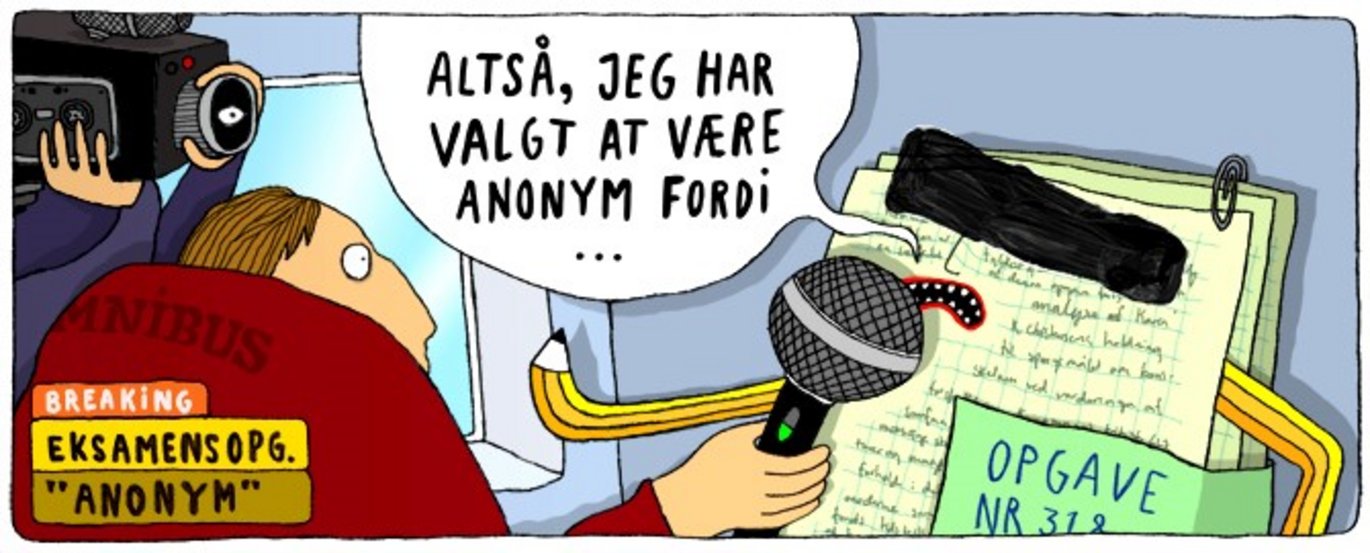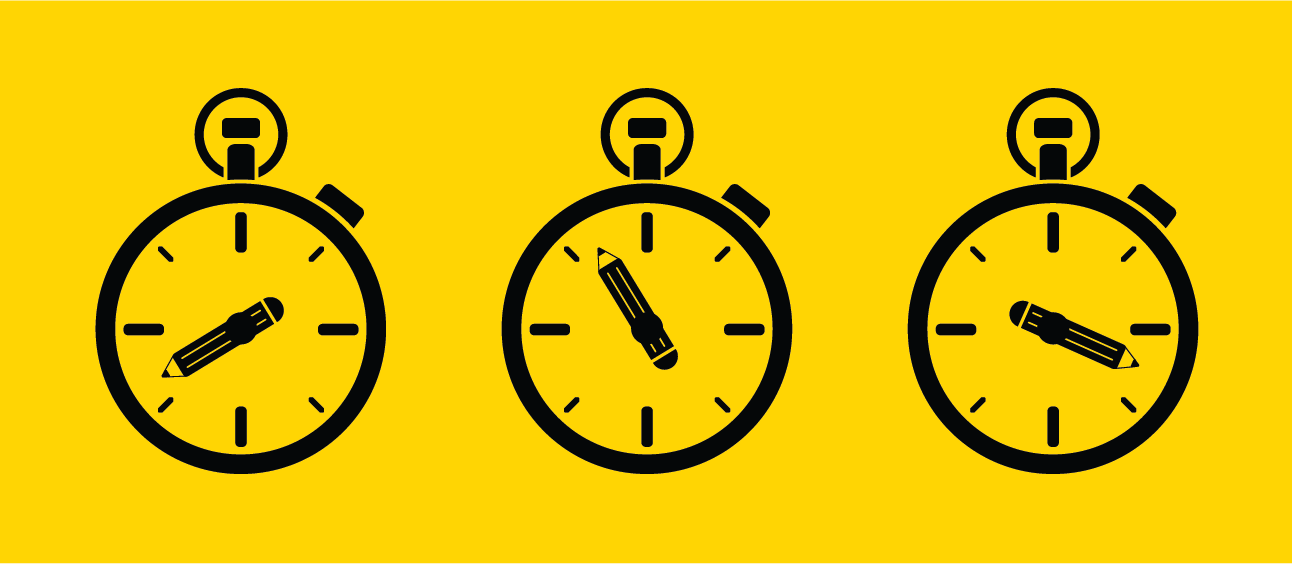Does your grade depend on your gender?
Aarhus BSS is introducing anonymous exams to ensure that students aren’t assessed on the basis of their gender or ethnicity. Arts is still considering whether to jump on the equality bandwagon. ST sees no reason to join the ride. And Health already has a front-row seat – without knowing it.


When students at Aarhus BSS sit down for their written exams this month, they will be instructed not to write their student registration number or name on their papers. Last year the School Board of Studies at Aarhus BSS decided to anonymise as many exams at possible at the faculty – not in response to student complaints about discriminatory treatment, but at the request of the faculty’s teaching staff.
“The issue was taken up because there’s a lot of research which suggests that we can’t avoid being influenced by information about gender and ethnicity when we assess an exam paper, even though we don’t want to be. It takes place at an unconscious level, and it can affect assessments both positively and negatively.”
Study: Female students are judged more harshly
- In a 2012 study, a team of researchers at Yale sent a student’s application for a lab manager position to a number of faculties.
- The applications were divided into two groups which were randomly assigned female or male names.
- The study showed that applications submitted under female names were assessed more negatively and applicants were ranked as less competent than applications under male names.
- According to the researchers behind the study, this points to a general gender bias in the assessment of student performance which puts female students at an unfair disadvantage.
- Link
Gitte Sommer Harrits, an associate professor at the Department of Political Science, was a member of the Aarhus BSS School Board of Studies when the issue of anonymising exams first came up in December 2015, and she refers to the study as a contributing factor. She explains that in addition to protecting students, anonymous exams safeguard teaching staff against suspicions of biased assessment, whether conscious or unconscious.
“As teachers, we actually prefer not to know the name, gender and ethnicity of the student whose exams we are assessing. Knowing their names has no positive effects, so this is not necessary information for the person assessing the exam.”
To the benefit of students
Steffen Selmer Andersen, a 9th-semester political science student, was a member of the School Board of Studies when the possibility of anonymising exams at Aarhus BSS first appeared on the agenda. He explains that the proposal was not motivated by students’ concrete experiences of unfair treatment, and that the students supported their teachers’ proposal.
“After all, it was completely obvious that it was to our benefit.”
DPU gets on board
Aarhus BSS is not the only place the anti-discrimination train has stopped. At the Danish School of Education (DPU), which is part of Arts, the board of studies has signed off on an anonymised exam pilot project. Winter exams in 2017-2018 will be the first batch of exams affected,
according to Anne-Marie Eggert Olsen, who is chair of the board of studies at DPU.
Like Harrits, she believes that there are advantages to blocking access to information examiners don’t need and don’t want:
“For example, take the case of grading an exam which is badly written and you’re aware that the student has a foreign-sounding name. It’s nice not to have to speculate about whether there’s a connection and whether you should make allowances.”
Facts: Anonymous exams at Aarhus BSS
- To ensure that exams are turned in anonymously at Aarhus BSS, students submit them through the program WISEflow.
- WISEflow assigns each exam a unique exam ID number.
- The identity of the student behind each ID number is only known to the administration, not to the examiner and the co-examiner.
But at DPU, unlike Aarhus BSS, considerations of the students’ legal rights and protections have been a major motive behind the introduction of anonymous exams. Malene Sillas Jensen, who is chair of the Student Council at DPU, explains that students are generally positive about the proposal.
“It’s an excellent project which ensures that all students are assessed fairly,” she says.
However, students do emphasise that it’s important to evaluate whether anonymous exams turn out to have any unfortunate side effects.
“We have to be careful to make sure that students don’t end up feeling like they’re just a number, because that can affect their motivation and learning negatively,”Jensen notes.
Even more necessary because of cutbacks
Olsen explains that she was inspired to introduce a debate on anonymous exams at DPU by the example of the University of Southern Denmark. In addition to the international studies which have revealed the existence of gender bias, she believes that there is another reason for the sudden focus on the problem:
“As a result of the many cutbacks on university education in Denmark, many institutions only use external co-examiners on a third of their exam papers, which is the legal minimum. At a lot of places, the programmes are so small that they have trouble finding an internal co-examiner who doesn’t know the students, and in several cases the only evaluator of an exam is the teacher of the course.”
As a consequence, according to Olsen, there is a risk that students’ legal right to a fair and impartial assessment of their work may be violated. In addition to helping to protect students’ legal rights, she also believes that anonymous exams may influence the students’ evaluation of their courses positively.
“It’s possible that students will dare to express themselves more candidly if they know that their names won’t be on their exams afterwards.”
Discussion at faculty level a possibility
Olsen has informed the Arts Forum for Education that DPU is trialling anonymous exams, and that they will report on the results of the pilot project in the spring.
According to Niels Overgaard Lehmann, vice-dean for education at Arts, the forum for education will discuss the possibility of introducing anonymous exams at the faculty as a whole on the background of DPU’s evaluation of the pilot project.
“We need to take a look at what comes out of the pilot project before we consider introducing anonymous exams faculty-wide, or whether we will continue to allow the individual boards of studies to decide whether this is something they want to go forward with,” he explains.
If the pilot project reveals significant differences between the grades awarded to anonymous versus non-anonymous exams, says Lehmann, this may indicate the existence of bias:
“In that case, I believe that it may be relevant to introduce anonymous exams at the entire faculty.”
Facts: Anonymous exams at DPU
- DPU’s board of studies has approved an pilot project to trial anonymous exams.
- Participation in the project is voluntary; the individual programmes have decided whether to opt in, and students decide whether or not to include their name and student registration number when handing in their exams.
- One of the participating degree programmes is education science, where 150-60 first-year BSc students are participating in anonymous written exams in January.
- The pilot project will be evaluated in the spring. After the evaluation, the board of studies will decide whether to introduce anonymous exams for all degree programmes at DPU.
Differing views at Arts
Not all of the faculty’s boards of studies are ready to embrace anonymous exams, however. While the board of studies at the School of Communication and Culture has also discussed introducing anonymous exams, they are not entirely certain that this is the best strategy for achieving equality.
“We don’t think that anonymous exams are necessary. But we do agree that if the motive for introducing anonymous exams is discrimination, we should address discrimination directly with a zero tolerance approach instead of anonymising exams,” explains Jody Pennington, chair of the board of studies at the School of Communication and Culture.
The board of studies discussed anonymous exams on 13 December 2017, and according to the minutes, confirmed that “exams may exclusively be assessed with reference to the learning objectives for the course”. However, the board of studies also decided that further investigation of whether anonymous exams benefit students is needed before further steps are taken – an approach which students support.
According to Christina Fiig, chair of the board of studies at the School of Culture and Society, the board will discuss the issue in the course of the spring of 2018.
No problems at ST
Finn Borchsenius, vice-dean for education at Science and Technology, states that no interest in anonymising exams has ever been expressed at his faculty, among other reasons because external co-examination is widespread, and the exams given to external co-examiners for assessment are always anonymised.
“We’ll follow developments, and we’ll take a closer look if that becomes necessary. If we anonymise exams, there has to be a reason for doing so,” says Borchsenius.
No changes at Health
Exams have always been anonymous at Health – but not in order to avoid gender and ethnic bias. The faculty’s studies administration office explains that exams are anonymised to ensure that students don’t have to worry about being assessed on the basis of their teacher’s personal impressions of them.

